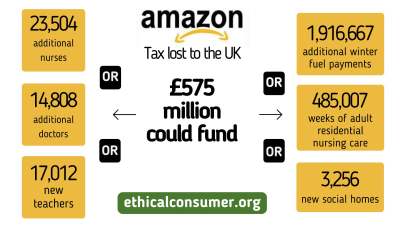Amazon has had a good year in the UK with income up by around 13%. Profit margins have also been rising. If we apply its latest average profit margin globally (which it discloses) to declared UK income, we can estimate that its UK profits could have been be an eye-watering £2.9 billion in 2024.
Being as Amazon does not disclose the amount (if any) of corporation tax actually paid in the UK, and the UK corporation tax rate is 25%, we think the loss to the exchequer could be as big as £575 million.
Tax raises for the public
Over the last five years, the combined potential loss of tax revenue from Amazon alone comes to nearly £2bn – an equivalent sum to some of the new taxes proposed recently to help fill the UK’s fiscal black hole.
Tax avoidance of this magnitude can be directly linked to the failing public services in this country. It also contributes to the worsening inequalities in society – with Amazon’s owners and shareholders continuing to distance themselves financially from everybody else. These two factors have also been linked to the rise of far right political parties.
It is thanks to the kind of pressure that campaigns like ours have been able to create, that Amazon now feels the need to publish long statements praising itself for the taxes that it does pay (i.e. the ones that are harder to avoid like VAT).
Despite these statements, its failure to disclose consolidated profits and corporation taxes paid in the UK (unlike most other businesses trading here), means that informed commentators like the Fair Tax Foundation remain unconvinced.






